COMMONS MAGAZINE
Walking is going places.
Humans’ most common pastime--forsaken for decades as too slow and too much effort-- is now recognized as a health breakthrough, an economic catalyst and a route to happiness.
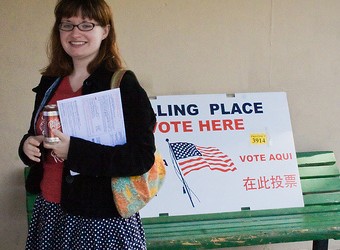
By Orin Zebest under a CC license
On November 4th, Democrats lost big when they ran a candidate but won big when they ran an issue.
In 42 states about 150 initiatives were on the ballot. While the majority of them did not address issues dividing the two parties (e.g. raising the mandatory retirement age for judges, salary increases for state legislators, bond issues supporting a range of projects), scores of initiatives did let voters weigh in on hot button issues. And on these American voters proved astonishingly liberal.
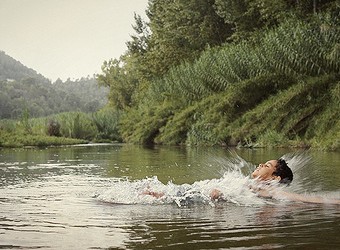
By Alba Soler under a CC license
An eight-year-old today asks “Will there still be snow when I grow up?” and we know that his question has merit. The world is changing, and it’s not just about snow. The world we’ll be leaving our children will be far more toxic and the natural world far less accessible than any other generation has ever experienced. In addition to extinction of species, there will also be an “extinction of experience.”

By Lieven Soete under a CC license
We have turned a corner on climate change-- a wrong turn-- and it is happening more rapidly than we have predicted. Climate change is already disrupting society, ecosystems, and national economies. We have altered so much of our Earth that we now threaten our own survival.

(By Steve Rhodes under a CC license)
Can an ancient legal principle with roots in Roman law serve as a tool for the climate protection movement?
I recently went to Dublin to facilitate a "Thinkery" about the Commons. The event was organized with my Irish co-conspirators, Orla O’Donovan and Mary McDermott, to coincide with the launch of a special issue of the Community Development Journal devoted to the commons. The participants were engaged and the discussions lively.
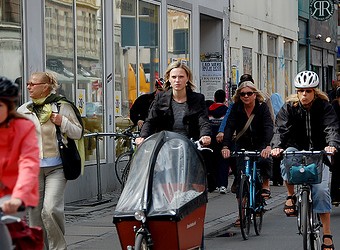
Copenhagen bikers have their own lane raised from the street. (By Spacing magazine under a CC license.)
Imagine a major city where 35 percent of all traffic is people on bikes. Or think even bigger--an entire nation where 27 percent of all trips are pedal-powered.
This is not some Utopian vision of the commons dreamed up by a 24-year-old after too many handcrafted beers. These are real places located in modern societies with high levels of car ownership. Places not so different from the US named Copenhagen and the Netherlands.
Scotland and Catalonia are brothers in arms. Independence movement leaders in the two places communicate regularly. On September 18, when Scotland voted on uncoupling from the United Kingdom, Catalans were on hand. When Catalonia votes on independence, a vote originally scheduled for November 9th but delayed pending a court decision, Scots will certainly be there.
Egleston Square is a rapidly gentrifying neighborhood, straddling the borders of Roxbury and Jamaica Plain (JP) in the city of Boston. High condo prices and even higher rents are pushing long-term residents, to move elsewhere. This churning of the real estate market, to be expected in a profit-maximizing system, dissolves community and acerbates race and class divides. It is now common to hear of talk of “Two JPs”-– one prosperous, highly educated, professional and largely White, and another struggling, working class, mainly immigrant and Hispanic.

(By Dale Calder under a Creative Commons license.)
From a distance, Jim Myers looks like an ordinary farmer. Most autumn mornings, he stands thigh-deep in a field of wet broccoli, beheading each plant with a single, sure swipe of his harvest knife. But under his waders are office clothes, and on his wrist is an oversized digital watch with a push-button calculator on its face. As his hand cuts, his eyes record data: stalk length and floret shape, the purple hue of perfect heads and the silver specks that foretell rot. At day’s end his broccoli goes to the food bank or the compost bin—it doesn’t really matter.
Carolyn Raffensperger, an environmental lawyer and public health advocate, is one of the America’s leading proponents of the Precautionary Principle. This common sense idea states that when an action is suspected of causing harm to people or the environment, the burden of proof is to demonstrate the action is not harmful before moving forward. The European Union has adopted the Precautionary Principle as a statutory requirement in some areas of law.

(By James Jordan under a CC license.)
Here's what I learned about the commons during my economics education at the University of Montana (BA, Economics 2004):
Common-pool resource [n]: a type of good consisting of a natural or human-made resource system, whose size or characteristics makes it costly, but not impossible, to exclude potential beneficiaries from obtaining benefits from its use. Examples of common-pool resources include irrigation systems, fishing grounds, pastures and forests.
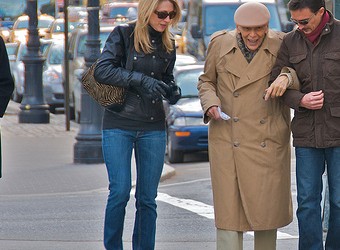
Even with heavy traffic traffic, many New York streets accomodate pedestrians. (By Ed Yourdon under a CC license.)
More than 4500 pedestrians (see earlier Commons magazine story) are killed by motor vehicles every year on the streets of America. This is not an inevitable fact of modern life. These deaths are preventable, as shown by the dramatic decline of pedestrian fatalities (as well as bicyclists and motorists) in Sweden after they adopted the
Welcome to the new OnTheCommons.org, which we’ve redesigned to better inform, inspire and equip you to make a difference in your community and the world. You’ll see no startling changes, just improvements to make our site easier to use and enjoy.
Introducing Commons Magazine
Since 1945 the number of nations has soared from about 60 to more than 180. The first wave of new sovereign states came with the decolonization movement of the 1960s and 1970s; the second in the early 1990s with the break-up of the Soviet Union. If Scotland votes for independence it may ignite a third wave. Dozens of would-be nations are waiting in the wings: Wales, Catalonia (Spain), Flanders (Belgium), Brittany (France), the list is long.
More than 4500 pedestrians are killed by motor vehicles every year on the streets of America--more than those who died in the horror of 9/11.
More than 4500 pedestrians are killed by motor vehicles every year on the streets of America--more than those who died in the horror of 9/11.
More than 4500 pedestrians are killed by motor vehicles every year on the streets of America--more than those who died in the horror of 9/11.
More than 4500 pedestrians are killed by motor vehicles every year on the streets of America--more than those who died in the horror of 9/11.
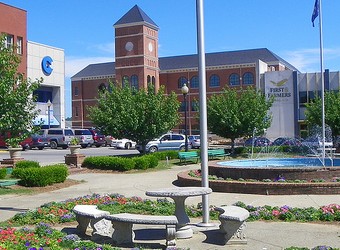
A Southern town that broadens government role in promoting the common good. (Photo by J. Stephen Conn under a CC license)
When two politicians debate the role of government, it almost always is a Democrat vs. Republican. Which is why it was so refreshing and instructive to read of the debate taking place among Republicans in a small city in southeastern Kentucky.